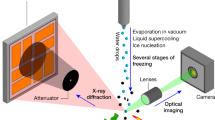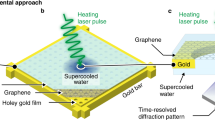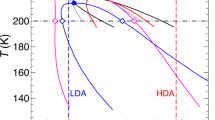Abstract
FREEZING nuclei in the atmosphere are characterized by a critical threshold temperature below which, and only below which, they initiate the freezing of water droplets with which they may be associated. I have devised a simple method of testing whether or not there is at least one freezing nucleus in a given sample of air (about 200 c.c.) which is active at any given temperature; it is similar to that described by me in 19471, except that expansions are performed more slowly (lasting about 1 sec., and allowing droplet growth to follow the cooling).
This is a preview of subscription content, access via your institution
Access options
Subscribe to this journal
Receive 51 print issues and online access
$199.00 per year
only $3.90 per issue
Buy this article
- Purchase on Springer Link
- Instant access to full article PDF
Prices may be subject to local taxes which are calculated during checkout
Similar content being viewed by others
References
Cwilong, B. M., Proc. Roy. Soc., A, 190, 137 (1947); Nature, 160, 198 (1947); 161, 62 (1948); 163, 727 (1949).
Bowen, E. G., Aust. J. Phys., 6, 490 (1953).
Author information
Authors and Affiliations
Rights and permissions
About this article
Cite this article
CWILONG, B. Abnormal Freezing Nuclei in the Atmosphere. Nature 176, 129–130 (1955). https://doi.org/10.1038/176129a0
Issue Date:
DOI: https://doi.org/10.1038/176129a0
This article is cited by
-
Precipitation of Sub-Micron Dust in Still Air by Cloud-Size Water Droplets
Nature (1961)
-
Measurements of Natural Freezing Nuclei at High Altitudes
Nature (1956)
-
Das Gefrieren unterkühlten Wassers in Beziehung zu interdiurnen Luftdruckänderungen und zur Solaraktivität
Archiv für Meteorologie, Geophysik und Bioklimatologie Serie B (1956)
Comments
By submitting a comment you agree to abide by our Terms and Community Guidelines. If you find something abusive or that does not comply with our terms or guidelines please flag it as inappropriate.



